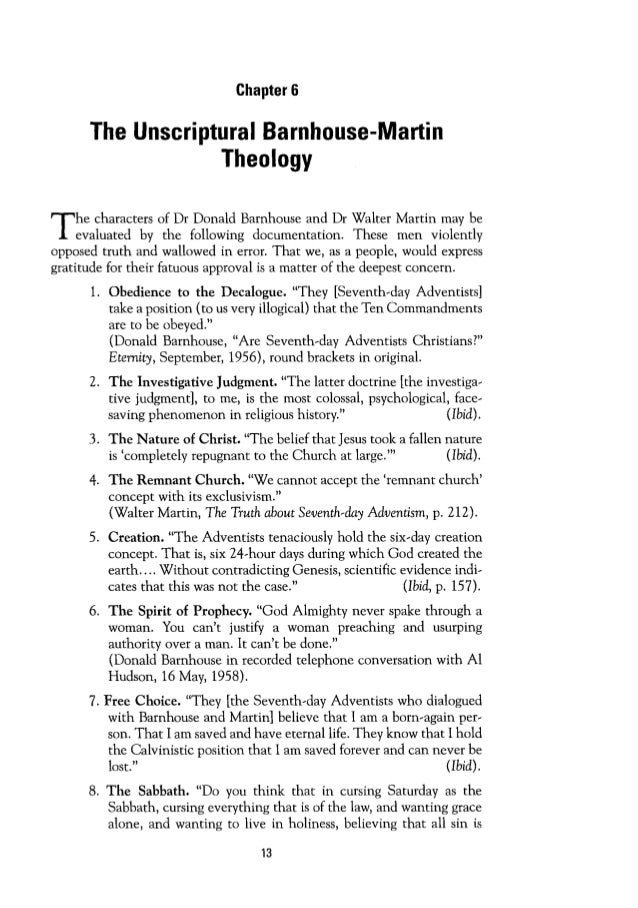- Method of revelation,v. Beatitude of Bible study,v. Greetings from John the writer, and from Jesus Christ in heaven,vv. The post-incarnate Christ in a glorified body, judging His church (the great High Priest in the Holy of Holies),vv. Time division of the contents of the apocalypse,v.
- Jan 01, 1971 Donald Grey Barnhouse is the father of Donal He was pastor of the Tenth Presbyterian Church in Philadelphia, Pennsylvania from 1927 to his death in 1960. As a pioneer in radio broadcasting, his program, The Bible Study Hour, continues today and is now known as Dr. Barnhouse & the Bible.
- Donald Barnhouse Revelation Pdf Bible Study Lessons
- Donald Barnhouse Revelation Pdf Bible Study Outline Of Romans
'The Book of Revelation is the book for the present hour. There is a special blessing promised to those who read it and to those who hear it and treasure the truth that God has seen fit to give us.' With these words Donald Barnhouse begins this helpful devotional commentary on the New Testament book that puzzles so many. The hallmark of this commentary is its applicability to Christian.
Taking the book of Romans as the departure point for an exposition of Bible doctrines, Barnhouse’s phrase by phrase commentary examines the epistle in its immediate context as well as in the larger context of Scripture. Scripture is thus interpreted by Scripture, bringing all the correlated truths of the Bible to bear on each line and word of Paul’s epistle. Or as Barnhouse expresses it, “The method employed is to take the epistle, phrase by phrase, and to invert the whole of the Bible, like a pyramid resting on its point, with the full weight of all the truth on each succeeding text, phrase, and even word.” Romans (full title: Expositions of Bible Doctrines Taking the Epistles to the Romans as a Point of Departure) is based on the author’s renowned series of radio broadcasts, themselves preceded by approximately 140 Sunday sermons on the epistle.

Demonstrating the author’s acute understanding of Romans and heart for effective preaching, these studies deftly and reverently expound even the most difficult passage in a clear way. Barnhouse’s concern for a universal appreciation of the epistle fuels his commentary and invites all readers into a deeper understanding of the life-changing message of Romans. Romans excels in three particulars. Its exegetical insight is characterized by accuracy, even brilliancy. The author is obviously well acquainted with the original text.
In the second place its illustrations are apt and telling In the third place, the appropriate application is made following each message. The commentary is commended highly as a valuable addition to the expository literature on the great Epistle to the Romans. Johnson, Jr., Bibliotheca Sacra Barnhouse has the gift to be able to present deep doctrinal truths in popular form without the loss of incisiveness. Conveyed in trenchant thought, clothed in poignant language, and clarified by apt illustration, the truth of the Scripture will be understood and remembered. Romans is highly commended to students of the Word. Dwight Pentecost, Bibliotheca Sacra. “Why have I chosen to direct your attention to that epistle of Paul’s which was sent originally to the Roman church?
Donald Barnhouse Revelation Pdf Bible Study Lessons

Donald Barnhouse Revelation Pdf Bible Study Outline Of Romans
It is because the epistle to the Romans has the most complete diagnosis of the plague of man’s sin, and the most glorious setting forth of the simple remedy of justification by faith apart from the works of the law.” Thus begins Part One of Barnhouse’s massive commentary on Romans. Entitled “Man’s Ruin,” Part One covers Romans 1:1-32. With the deft eye of a master exegete, Barnhouse preaches on a number of issues in messages which include “The Trinity,” “The Communion of the Saints,” “God’s Righteousness” and 24 others. Through a discussion of mankind’s fallenness may be difficult for many to stomach, Barnhouse’s meditation on man’s separation from God is a necessary component to any study of Romans. As Barnhouse expresses himself, “It is not pleasant to set forth these truths in the ears of men who do not wish to hear the truth, but it is in faithfulness to God that we thus speak.” Barnhouse continues his reflection on the consequences of sin in Part Two, “God’s Wrath.” Covering Romans 2-3:1-20, Barnhouse distills the essence of these chapters thusly: “The object of these chapters is to go from the fact that all men are sinners to the terrible consequences of that fact.
We must see that the inevitable result of our sinfulness is the certainty of God’s judgment upon all unrighteousness.” Included are messages entitled “God’s Standards Manifest,” “The Power of Faith in Life,” “Circumcision,” “Righteousness Without Works,” and 22 others. Though discussion of these topics, Barnhouse hopes that his readers “may know how crooked mankind really is, and may turn from the folly of self-effort to the reality of faith in Christ.”.
Part Three of Barnhouse’s commentary, entitled “God’s Remedy,” looks at Romans 3:21 – 4:1-25. After the sobering examination of mankind’s unrighteousness and God’s justifiable wrath, Barnhouse discusses the “righteousness of God manifested in Christ.
What could not be produced by man is here seen as provided for man.” “God’s Remedy” includes the messages “Righteousness Without the Law,” “Redemption,” “The Blood of Christ,” “Faith Apart from the Law,” “The Progress and Growth of Faith,” and 32 others. Throughout Part Three, Barnhouse develops the concept of God’s Grace in the New Covenant, and points to the hope in Christ for all mankind; “That is why I say that Christianity can be expressed in the three phases: I deserved Hell; Jesus took my Hell; there is nothing left for me but His Heaven.” Part Four, “God’s River,” comments on Romans 5:1-11. Continuing his analysis of justification, Barnhouse shows “One of the most triumphant truths in Scripture is that we are justified by God; and one of the most triumphant expressions of this truth is Romans 5:1.” Barnhouse shows the way to and nature of Salvation for mankind as he takes on these issues in messages entitled “Our Seven-Fold Justification,” “Peace with God,” “God’s Purpose in Human Suffering,” “The Sources of Hope,” along with 19 others. Part Five of Barnhouse’s commentary considers the Christian life in practical terms, “For the Christian life is not withdrawal from the world.” Entitled “God’s Grace,” Part Five takes a look at Romans 5:12-21.
Barnhouse expresses the purpose of this section of the epistle in messages such as “Adam Versus Christ,” “Reigning in Life,” “The Pure Doctrine of Grace,” and “God’s Motives for Grace” to name a handful of the 25 messages included. Part Six, “God’s Freedom,” examines Romans 6:1 – 7:25. In these chapters, the apostle Paul describes the concept of Christian liberty, including the believer’s freedom from sin, the freedom from the law, the freedom unto holiness, and the freedom to be a servant of righteousness. Among the 19 messages are “A Call to Holy Living,” “From Death to Life,” “Living with the Risen Christ,” and “The Essentials of Christian Conduct.” “God’s Heirs,” Part Seven of Barnhouse’s commentary, covers Romans 8:1-39. Here, Paul shows that the true child of God is free from the law of sin and death in Jesus Christ. Romans 8 clearly sets forth God’s remedy in Christ for man’s complete ruin in sin.
Not only are believers redeemed, they are children and heirs of God. Barnhouse expounds on this joyous fact in 21 chapters, including “No Condemnation,” “Walking in the Spirit,” “God’s Work in Us,” and “The Real Secret of Living.”. Part Eight of Barnhouse’s monumental commentary tackles Romans 9:1 – 11:36. Entitled “God’s Covenants,” Part Eight shows that Paul’s main purpose in these chapters is to demonstrate that his great teaching on justification, sanctification and the assurance of the believer, set forth in the first eight chapters, is not to overlook the blessing or restoration which is to come to his ancient people, Israel. These chapters show that God has not cast off His people, but that His ultimate purpose includes the fulfillment of every promise made to them. Among the 19 messages in Part Eight are “Paul’s Desire for Israel,” “Children of the Promise,” “God’s Disobedient People,” and “When God Hardens Hearts.” Part Nine, “God’s Discipline,” looks at Romans 12:1 – 14:12. One of the great tragedies in the Christian world today is that many believers feel salvation only has to do with their going to heaven and being delivered from hell. Nero express 12 скачать бесплатно.
They overlook the fact that salvation has to do with the here and now, as well as the hereafter. Not only are we to be saved, but we are to be disciples of the Lord Jesus Christ. “God’s Discipline,” sets forth the demands of Christ in clear unmistakable terms. Messages include “Living Sacrifice,” “Diversities of Gifts,” “Lest You Be Hypocrites,” and “The Christian’s Obligations” among 22 others. “God’s Glory,” Part Ten of Barnhouse’s commentary, closes his study of this great epistle. Here, the commentator analyzes Romans 14:13 – 16:27, and presents such messages as “Not Rules but Righteousness,” “Obedience in Word and Deed,” “Your Will or God’s,” and “The Bruising of Satan” among 19 others. Excerpted from.
Barnhouse, Donald Grey (1895-1960). Probably the best known and most widely followed American Bible teacher during the early middle decades of this century. Born in Watsonville, California, he gained his training in a broad variety of institutions including Biola, Princeton Seminary, Eastern Seminary, and the University of Pennsylvania. In 1927 Barnhouse accepted the pulpit of Tenth Presbyterian Church in downtown Philadelphia, and it was from this church, where he continued the rest of his life, that he built his national and international empire.
As early as 1928 and continuing through most of his career he spoke over radio networks of up to 455 stations, using the Bible expository method of teaching. The popularity of these broadcasts and later telecasts led to many invitations to conduct Bible conferences, and the increasing demand of these conferences led him, after 1940, to be absent from his pulpit six months a year. Also serving as an outlet for his sermons, Bible studies, essays, and editorials were the two magazines which he founded and edited, Revelation (1931–49) and Eternity, which continues to the present. Barnhouse’s theology was an eclectic yet independent mix of dispensationalism, Calvinism, and fundamentalism. As a dispensationalist he developed elaborate eschatological schemes, yet he departed significantly from much dispensationalist teaching. His fearless and brusque attacks upon liberal Presbyterian clergymen led the Philadelphia Presbytery to censure him in 1932, yet he opposed the fundamentalist concept of separation, and in his later years gradually grew more mellow in his relations with the Presbyterian Church and the National Council of Churches.
Options for accessing this content:. If you are a society or association member and require assistance with obtaining online access instructions please contact our Journal Customer Services team. Login via other institutional login options. You can purchase online access to this Article for a 24-hour period (price varies by title). If you already have a Wiley Online Library or Wiley InterScience user account: login above and proceed to purchase the article.
New Users: Please register, then proceed to purchase the article.